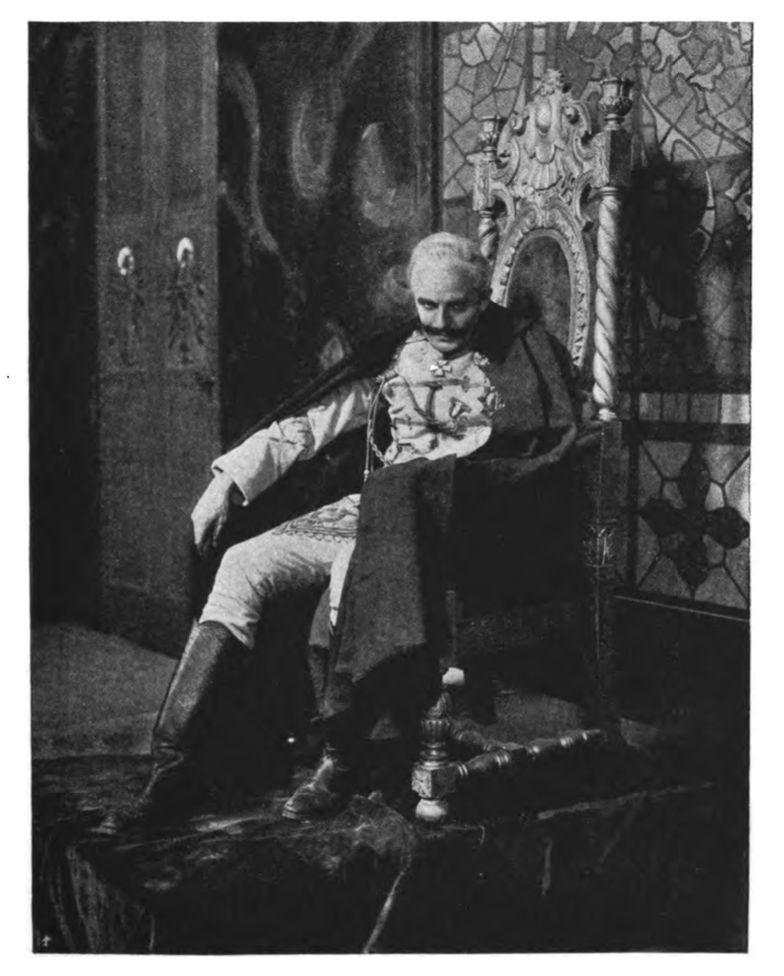BLOOD AND IRON (6)
By:
December 17, 2023

“Blood and Iron: A Play in One Act,” A Radium Age proto-sf ancestor of The Six Million Dollar Man and RoboCop, was first published in the December 1917 issue of The Strand. (Note that the play predates Karel Čapek’s “R.U.R.: Rossum’s Universal Robots” by four years.) HiLoBooks is pleased to serialize it here for HILOBROW’s readers.
ALL INSTALLMENTS: 1 | 2 | 3 | 4 | 5 | 6 | 7 | 8.
EMPEROR (Bracing himself in the chair.): Lights out! (SCIENTIST presses button. Stage is in total darkness.) Describe my movements as they occur.
VOICE OF SCIENTIST (To 241.): Do you understand His Majesty?
VOICE oF 241: Yes. He — leans — forward — in — his — chair. He — lifts — both — his — hands. The — palms — come — together. He — bows — his — head — in — prayer.
VOICE OF EMPEROR (Sharply.): Lights!
(SCIENTIST presses button. Lights on, disclosing EMPEROR exactly in the attitude described by 241, with a startled look on his face, palms still together.)
SCIENTIST: Enough, your Majesty?
EMPEROR (Relaxing nervously.): It is beyond human understanding. (Recovers himself and rises.) And it gives me infinite happiness to bestow upon you this mark of our esteem. (Takes from his own breast the Order of Merit and pins it on breast of SCIENTIST.) The Order of Merit! There is but one higher decoration — the symbol of Divine Right — the Reward of Heaven. (EMPEROR lays his hand on the seven-starred emblem.) Which I alone possess.
SCIENTIST (Overwhelmed, bows and kisses EMPEROR’s hand.): Your gracious Majesty! To have received this from your imperial hand on your Majesty’s birthday is indeed a distinction.
(A furtive glance escapes 241, a thin smile reveals his metallic teeth; a sinister look comes into his eyes. Emperor reseats himself with a gesture of benediction.)
EMPEROR: I marvel at his dexterity — at his auricular powers — at his incomparable eyesight! What is his range of vision?
SCIENTIST: Your Majesty, he can see the enemy twenty or thirty miles away, count its cannon, its horses, its equipment.
EMPEROR (Quickly.): Wait! I will make another test. I carry next to my heart the smallest copy of the Bible extant. It can be read only under a microscope. Is the test too severe?
SCIENTIST: On the contrary, your Majesty: it is preferable. (Crosses and takes Bible from EMPEROR’s hand. Turns to 241.) Attention! Right about face! (241 salutes.) I open the book at haphazard. Read a verse from this page.
241: Matthew — Fifth — Chapter — fourth — verse. “Blessed — are — they — that — mourn — for — they — shall — be — comforted.
SCIENTIST: The fifth.
RADIUM AGE PROTO-SF: “Radium Age” is Josh Glenn’s name for the nascent sf genre’s c. 1900–1935 era, a period which saw the discovery of radioactivity, i.e., the revelation that matter itself is constantly in movement — a fitting metaphor for the first decades of the 20th century, during which old scientific, religious, political, and social certainties were shattered. More info here.
SERIALIZED BY HILOBOOKS: James Parker’s Cocky the Fox | Annalee Newitz’s “The Great Oxygen Race” | Matthew Battles’s “Imago” | & many more original and reissued novels and stories.
